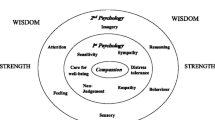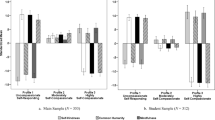Abstract
Objectives
Taking the dialecticism of emotions (emotional typology) as theoretical basis, the present study investigated profiles of self-compassion considering response patterns on items of compassionate self-responding (self-kindness, common humanity, and mindfulness) and reduced uncompassionate self-responding (reduced self-judgement, isolation, and over-identification) and examined the differences in individuals’ psychological well-being across various self-compassion profiles.
Methods
A total of 358 Chinese college students were included in the study. They completed scales on self-compassion, positive aspects of psychological well-being (self-esteem, life satisfaction, and resilience), and negative aspects of psychological well-being (anger and depressive symptoms). Latent profile analysis was used to identify the profiles of self-compassion.
Results
Four profiles of self-compassion were identified: nondialectical low self-compassion, nondialectical high self-compassion, dialectical moderate self-compassion, and dialectical high self-compassion. Participants in the high self-compassion profiles reported higher degrees of positive psychological well-being and lower degrees of negative psychological well-being than those in the other two profiles. Participants in the nondialectical high self-compassion profile reported higher levels of resilience and self-esteem and lower levels of depressive symptoms and anger than those in the dialectical high self-compassion profile. Participants in the dialectical high self-compassion profile reported higher levels of resilience, self-esteem, and life satisfaction and lower levels of depressive symptoms than those in the dialectical moderate self-compassion profile.
Conclusions
Findings suggest that Easterners have various emotion regulation patterns for coping with unpleasant experiences. In future interventions, practitioners could select the appropriate aspects of self-compassion for improvement with consideration of the clients’ self-compassion profile.

Similar content being viewed by others
References
Asparouhov, T., & Muthén, B. (2014). Auxiliary variables in mixture modeling: Using the BCH method in Mplus to estimate a distal outcome model and an arbitrary secondary model. Mplus Web Notes, 21(2), 1–22. Retrieved from https://www.statmodel.com/examples/webnotes/webnote21.pdf.
Bagozzi, R. P., & Yi, Y. (1993). Multitrait-multimethod matrices in consumer research: Critique and new developments. Journal of Consumer Psychology, 2, 143–170. https://doi.org/10.1016/S1057-7408(08)80022-8.
Bai, X., Wu, C., Zheng, R., & Ren, X. (2011). The psychometric evaluation of the satisfaction with life scale using a nationally representative sample of China. Journal of Happiness Studies, 12, 183–197. https://doi.org/10.1007/s10902-010-9186-x.
Berlin, K. S., Williams, N. A., & Parra, G. R. (2014). An introduction to latent variable mixture modeling (part 1): Overview and cross-sectional latent class and latent profile analyses. Journal of Pediatric Psychology, 39, 174–187. https://doi.org/10.1093/jpepsy/jst084.
Brenner, R. E., Heath, P. J., Vogel, D. L., & Credé, M. (2017). Two is more valid than one: Examining the factor structure of the Self-Compassion Scale (SCS). Journal of Counseling Psychology, 64, 696–707. https://doi.org/10.1037/cou0000211.
Campbell-Sills, L., & Stein, M. B. (2007). Psychometric analysis and refinement of the Connor–Davidson resilience scale (CD-RISC): Validation of a 10-item measure of resilience. Journal of Traumatic Stress, 20, 1019–1028. https://doi.org/10.1002/jts.20271.
Chen, J., Yan, L., & Zhou, L. (2011). Reliability and validity of Chinese version of self-compassion scale. Chinese. Journal of Clinical Psychology, 19, 734–736. https://doi.org/10.16128/j.cnki.1005-3611.2011.06.006.
Cleare, S., Gumley, A., Cleare, C. J., & O’Connor, R. C. (2018). An investigation of the factor structure of the Self-Compassion Scale. Mindfulness, 9, 618–628. https://doi.org/10.1007/s12671-017-0803-1.
Connor, K. M., & Davidson, J. R. (2003). Development of a new resilience scale: The Connor-Davidson resilience scale (CD-RISC). Depression and Anxiety, 18, 76–82. https://doi.org/10.1002/da.10113.
Coroiu, A., Kwakkenbos, L., Moran, C., Thombs, B., Albani, C., Bourkas, S., et al. (2018). Structural validation of the Self-Compassion Scale with a German general population sample. PLoS One, 13(2), e0190771.
Deng, X., Sang, B., & Luan, Z. (2013). Up-and down-regulation of daily emotion: An experience sampling study of Chinese adolescents' regulatory tendency and effects. Psychological Reports, 113, 552–565. https://doi.org/10.2466/09.10.PR0.113x22z4.
Diener, E. D., Emmons, R. A., Larsen, R. J., & Griffin, S. (1985). The satisfaction with life scale. Journal of Personality Assessment, 49, 71–75. https://doi.org/10.1207/s15327752jpa4901_13.
Eid, M., & Diener, E. (2001). Norms for experiencing emotions in different cultures: Inter- and intranational differences. Journal of Personality and Social Psychology, 81, 869–885. https://doi.org/10.1037/0022-3514.81.5.869.
Geiser, C. (2012). Data analysis with Mplus. New York: Guilford press.
Gilbert, P., Catarino, F., Duarte, C., Matos, M., Kolts, R., Stubbs, J., et al. (2017). The development of compassionate engagement and action scales for self and others. Journal of Compassionate Health Care, 4, 4. https://doi.org/10.1186/s40639-017-0033-3.
Gross, J. J. (2013). Emotion regulation: Taking stock and moving forward. Emotion, 13, 359–365. https://doi.org/10.1037/a0032135.
Lee, I. A., & Preacher, K. J. (2013). Calculation for the test of the difference between two dependent correlations with one variable in common [Computer software]. Retrieved from https://quantpsy.org.
Lei, Z., Xu, R., Deng, S., & Luo, Y. (2011). Reliability and validity of the Chinese version of State-Trait Depression Scale in college students. Chinese Mental Health Journal, 25, 136–140. https://doi.org/10.3969/j.issn.1000-6729.2011.02.013.
López, A., Sanderman, R., Smink, A., Zhang, Y., van Sonderen, E., Ranchor, A., & Schroevers, M. J. (2015). A reconsideration of the Self-Compassion Scale’s total score: Self-compassion versus self-criticism. PLoS One, 10, e0132940. https://doi.org/10.1371/journal.pone.0132940.
Luo, Y., Zhang, D., Liu, Y., & Liu, Y. (2011). Reliability and validity of the Chinese version of Trait Anger Scale in college students. Chinese Mental Health Journal, 25, 700–704. https://doi.org/10.3969/j.issn.1000-6729.2011.09.015.
Miyamoto, Y., & Ma, X. (2011). Dampening or savoring positive emotions: A dialectical cultural script guides emotion regulation. Emotion, 11, 1346–1357. https://doi.org/10.1037/a0025135.
Miyamoto, Y., & Ryff, C. D. (2011). Cultural differences in the dialectical and non-dialectical emotional styles and their implications for health. Cognition and Emotion, 25, 22–39. https://doi.org/10.1080/02699931003612114.
Miyamoto, Y., Ma, X., & Petermann, A. G. (2014). Cultural differences in hedonic emotion regulation after a negative event. Emotion, 14, 804–815. https://doi.org/10.1037/a0036257.
Muris, P., & Petrocchi, N. (2017). Protection or vulnerability? A meta-analysis of the relations between the positive and negative components of self-compassion and psychopathology. Clinical Psychology & Psychotherapy, 24, 373–383. https://doi.org/10.1002/cpp.2005.
Muris, P., Meesters, C., Pierik, A., & de Kock, B. (2016). Good for the self: Self-compassion and other self-related constructs in relation to symptoms of anxiety and depression in non-clinical youths. Journal of Child and Family Studies, 25, 607–617. https://doi.org/10.1007/s10826-015-0235-2.
Muris, P., van den Broek, M., Otgaar, H., Oudenhoven, I., & Lennartz, J. (2018). Good and bad sides of self-compassion: A face validity check of the self-compassion scale and an investigation of its relations to coping and emotional symptoms in non-clinical adolescents. Journal of Child and Family Studies, 27, 2411–2421. https://doi.org/10.1007/s10826-018-1099-z.
Muris, P., Otgaar, H., & Pfattheicher, S. (2019). Stripping the forest from the rotten trees: Compassionate self-responding is a way of coping, but reduced uncompassionate self-responding mainly reflects psychopathology. Mindfulness, 10, 196–199. https://doi.org/10.1007/s12671-018-1030-0.
Neff, K. D. (2003a). Self-compassion: An alternative conceptualization of a healthy attitude toward oneself. Self and Identity, 2, 85–101. https://doi.org/10.1080/15298860390129863.
Neff, K. D. (2003b). The development and validation of a scale to measure self-compassion. Self and Identity, 2, 223–250. https://doi.org/10.1080/15298860390209035.
Neff, K. D. (2016). Does self-compassion entail reduced self-judgment, isolation, and over-identification? A response to Muris, Otgaar, and Petrocchi (2016). Mindfulness, 7, 791–797. https://doi.org/10.1007/s12671-016-0531-y.
Neff, K. D., Whittaker, T. A., & Karl, A. (2017). Examining the factor structure of the self-compassion scale in four distinct populations: Is the use of a total scale score justified? Journal of Personality Assessment, 99, 596–607. https://doi.org/10.1080/00223891.2016.1269334.
Neff, K. D., Long, P., Knox, M. C., Davidson, O., Kuchar, A., Costigan, A., Williamson, Z., Rohleder, N., Tóth-Király, I., & Breines, J. G. (2018). The forest and the trees: Examining the association of self-compassion and its positive and negative components with psychological functioning. Self and Identity, 17, 627–645. https://doi.org/10.1080/15298868.2018.1436587.
Neff, K. D., Tóth-Király, I., Yarnell, L. M., Arimitsu, K., Castilho, P., Ghorbani, N., Guo, H., Hirsch, J., Hupfield, J., Hutz, C. S., Kotsou, I., Lee, W. K., Montero-Marin, J., Sirois, F. M., de Souza, L., Svendsen, J., Wilkinson, L., & Mantzios, M. (2019). Examining the factor structure of the Self-Compassion Scale in 20 diverse samples: Support for use of a total score and six subscale scores. Psychological Assessment, 31, 27–45. https://doi.org/10.1037/pas0000629.
Peng, K., & Nisbett, R. (1999). Culture, dialectics, and reasoning about contradiction. American Psychologist, 54, 741–754. https://doi.org/10.1037/0003-066X.54.9.741.
Pfattheicher, S., Geiger, M., Hartung, J., Weiss, S., & Schindler, S. (2017). Old wine in new bottles? The case of self-compassion and neuroticism. European Journal of Personality, 31, 160–169. https://doi.org/10.1002/per.2097.
Podsakoff, P. M., MacKenzie, S. B., Lee, J. Y., & Podsakoff, N. P. (2003). Common method biases in behavioral research: A critical review of the literature and recommended remedies. Journal of Applied Psychology, 88, 879–903. https://doi.org/10.1037/0021-9010.88.5.879.
Rosenberg, M. (1965). Society and the adolescent self-image. Princeton: Princeton University Press.
Shiota, M. N., Campos, B., Gonzaga, G. C., Keltner, D., & Peng, K. (2010). I love you but…: Cultural differences in complexity of emotional experience during interaction with a romantic partner. Cognition and Emotion, 24, 786–799. https://doi.org/10.1080/02699930902990480.
Sims, T., Tsai, J. L., Jiang, D., Wang, Y., Fung, H. H., & Zhang, X. (2015). Wanting to maximize the positive and minimize the negative: Implications for mixed affective experience in American and Chinese contexts. Journal of Personality and Social Psychology, 109, 292–315. https://doi.org/10.1037/a0039276.
Spielberger, C. D., Jacobs, G., Russell, S., & Crane, R. S. (1983). Assessment of anger: The state-trait anger scale. Advances in Personality Assessment, 2, 159–187. https://doi.org/10.1177/0306624X15577932.
Spielberger, C. D., Carretero-Dios, H., De los Santos-Roig, M., & Buela-Casal, G. (2002). Spanish experimental version of the statetrait depression questionnaire (STDEP): Trait sub-scale (T-DEP). Journal of Clinical and Health Psychology, 2, 51–69. Retrieved from http: //www.redalyc.org/articulo.oa?id=33720104.
Sun, X., Chan, D. W., & Chan, L. K. (2016). Self-compassion and psychological well-being among adolescents in Hong Kong: Exploring gender differences. Personality and Individual Differences, 101, 288–292. https://doi.org/10.1016/j.paid.2016.06.011.
Tangney, J. P., & Fischer, K. (Eds.). (1995). Self-conscious emotions: The psychology of shame, guilt, embarrassment, and pride. New York: Guilford Press.
Tsai, W., & Lau, A. S. (2013). Cultural differences in emotion regulation during self-reflection on negative personal experiences. Cognition & Emotion, 27, 416–429. https://doi.org/10.1080/02699931.2012.715080.
Wang, X., Wang, X., & Ma, H. (1999). Rating scales for mental health. Beijing: Chinese Mental Health Journal Publisher.
Wong, C. C., Mak, W. W., & Liao, K. Y. H. (2016). Self-compassion: A potential buffer against affiliate stigma experienced by parents of children with autism spectrum disorders. Mindfulness, 7, 1385–1395. https://doi.org/10.1007/s12671-016-0580-2.
Zessin, U., Dickhäuser, O., & Garbade, S. (2015). The relationship between self-compassion and well-being: A meta-analysis. Applied Psychology: Health and Well-Being, 7, 340–364. https://doi.org/10.1111/aphw.12051.
Funding
This research receive support by the Grant MYRG2018-00098-FSS awarded to Dr. Peilian Chi from the Research Council at University of Macau.
Author information
Authors and Affiliations
Contributions
Qinglu Wu designed and executed the study, conducted data analysis, wrote and revised the manuscript. Chuqian Chen collaborated with the design, assisted with data analysis, and wrote the section of Results. Yue Liang collaborated with the design and assisted with the data analysis. Nan Zhou collaborated with the design and assisted with the data analysis. Hongjian Cao collaborated with the design and assisted with the data analysis. Hongfei Du collaborated with the design, edited, and reviewed the manuscript. Xiuyun Lin collaborated with the design. Peilian Chi designed the study, collected the data, edited and reviewed the manuscript. All authors approved the final version of the manuscript for submission.
Corresponding author
Ethics declarations
Conflict of Interest
The authors declare that they have no conflict of interest.
Ethical Standards
Ethical approval was obtained from the research ethics committee of the Department of Psychology at the University of Macau.
Informed Consent
Informed consent was obtained from all participants included in the study.
Additional information
Publisher’s Note
Springer Nature remains neutral with regard to jurisdictional claims in published maps and institutional affiliations.
Rights and permissions
About this article
Cite this article
Wu, Q., Chen, C., Liang, Y. et al. Not Only the Forest and Trees but Also the Ground They Are Rooted in: Identifying Profiles of Self-Compassion from the Perspective of Dialecticism. Mindfulness 11, 1967–1977 (2020). https://doi.org/10.1007/s12671-020-01406-6
Published:
Issue Date:
DOI: https://doi.org/10.1007/s12671-020-01406-6




